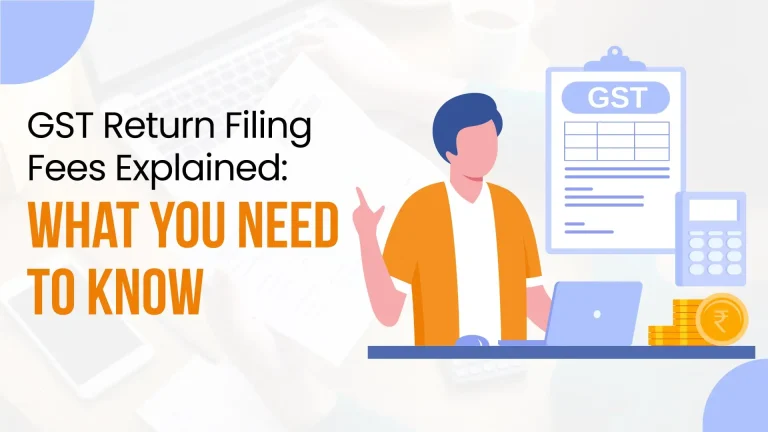In the world of taxes and managing money, it’s super important for both businesses and regular folks like you to really get how GST return filing fees work. Doesn’t matter if you’ve been running a business for years or you’re just starting out, knowing about these fees is a big deal. If you don’t want to get hit with fines and penalties, you’ve gotta understand what’s up with GST return filing fees. So, in this guide, we’re gonna break it all down for you, making it easy to understand and giving you all the info you need to handle this tax stuff smoothly.
What is GST?
GST, short for Goods and Services Tax, is a type of tax that gets added to the price of goods and services in India. It came into the picture in 2017, taking over from a bunch of other taxes, and it basically made the whole tax system simpler and smoother. The GST system covers a bunch of stuff, like getting credit for the taxes you’ve already paid on your purchases, the different tax rates for different goods and services, and the rules you need to follow to stay on the right side of the taxman. All these factors play into how much you’ll end up paying when you file your GST return.
Understanding GST Return Filing
GST return filing is like sending a report card to the government. It shows what you bought, sold, and how much tax you owe. It’s important because it helps the government keep track of taxes and ensures everyone follows the rules. How often and how you file your GST return depends on how much business you do and what type of business you have. If you don’t file your GST return on time or make mistakes, you might have to pay fines or face legal trouble. So, it’s crucial to do it right and on time.
GST Return Filing Fees:
The fees for GST return filing can vary based on several factors such as the type of return being filed, the turnover of the business, and whether any late fees or penalties apply. Here’s a breakdown:
- Government Fees: When you file your GST returns, the government charges a small fee. This fee can vary depending on what type of return you’re filing and how much money your business makes. The money collected from these fees helps cover the costs of managing and processing GST filings.
- Late Fees: If you miss the deadline for filing your GST returns, you’ll have to pay a late fee. This fee keeps increasing every day until you finally submit your returns. It’s really important to file on time to avoid these extra charges.
- Professional Fees: Some businesses hire experts like tax professionals or accountants to help them with their GST returns. These experts charge a fee for their services, which can depend on how complicated your returns are and how much help you need.
- Penalties: If you make mistakes or don’t follow the rules when filing your GST returns, you could face penalties from the government. These penalties are meant to discourage people from breaking the rules and stress the importance of keeping accurate records and following GST regulations.
It’s essential to note that the exact amount of GST return filing fees can differ from one business to another. Businesses with higher turnovers or more complex operations may incur higher fees compared to smaller entities. Additionally, the frequency of filing and any past compliance history can also influence the total fees incurred.
To get a precise estimate of GST return filing fees for your business, it’s recommended to consult with a tax advisor or use online calculators provided by tax authorities. They can help you determine the specific fees applicable to your situation based on current regulations and guidelines.
Factors Influencing GST Return Filing Fees
Several factors affect how much businesses pay for GST return filing:
- Business Turnover: This is how much money a business makes. The more money a business earns, the more often it needs to file GST returns. So, businesses with higher turnovers have to file more often, which means they end up paying more in filing fees.
- Type of Business: Different types of businesses have different rules to follow for GST filing. Some industries might have special rules or exceptions, which can make filing more complex and costly.
- Compliance History: This refers to how well a business follows the rules for filing GST returns. If a business has a good history of filing returns on time and without mistakes, it’s less likely to face penalties or late fees. But if a business has a history of not following the rules, it might end up paying more in fees because of penalties and extra attention from tax authorities.
Tips for Minimizing GST Return Filing Fees
Although GST return filing fees are something businesses can’t avoid when it comes to tax rules, there are ways to make these costs lower:
- Keep Good Records: It’s super important to keep really detailed records of all your sales, purchases, and expenses. This makes it way easier when it comes time to file your GST return. Plus, it lowers the chances of making mistakes that could get you in trouble and cost you more.
- Stick to Deadlines: Making sure you send in your GST returns on time is a big deal. If you’re late, you might have to pay extra fees. So, setting up reminders and having a solid plan for getting your returns in before the due date is key.
- Get Help if You Need It: Sometimes, dealing with taxes can get really confusing. That’s where tax pros come in handy. Hiring a tax expert can help you navigate all the tricky parts of GST rules and make sure you’re doing everything right. This can save you from making costly mistakes that could land you in hot water with the tax folks.
Future Outlook
As the regulatory landscape evolves and technology continues to advance, the future of GST return filing may witness further simplification and automation. Initiatives such as the Goods and Services Tax Network (GSTN) aim to enhance the efficiency and transparency of GST compliance through digital platforms and data analytics. Embracing technological solutions and staying abreast of regulatory updates can empower businesses to adapt to changes proactively and optimize their GST return filing processes.
In the dynamic realm of taxation, staying informed and proactive is key to navigating the complexities of GST return filing fees. By understanding the components, factors, and best practices outlined in this guide, businesses and individuals can minimize compliance costs, mitigate risks, and ensure seamless adherence to GST regulations. Remember, compliance is not just a legal obligation but also a strategic imperative for fostering trust with stakeholders and sustaining long-term growth in the competitive marketplace.
Also Read:
- Why Would a Business Need to Cancel GST Registration?Goods and Services Tax (GST) has streamlined indirect taxation and brought about a unified system across the country. But while registering under GST is mandatory for many businesses, there may come a time when cancelling GST registration becomes not just… Read more: Why Would a Business Need to Cancel GST Registration?
- Why Should You Use Software for Your Annual GST Return?The annual GST return demands attention because filing it proves challenging. Does the procedure appear complicated together with being time-intensive? If so, you’re not alone! Companies encounter annual problems when they try to bring together their GST data for compliance… Read more: Why Should You Use Software for Your Annual GST Return?
- Why Is Timely GST Payment Important for Your Business?As the backbone of India’s taxation system, Goods and Services Tax (GST) plays a pivotal role in simplifying the business environment. However, it also brings with it a host of compliance requirements that businesses must navigate. Among these, timely GST… Read more: Why Is Timely GST Payment Important for Your Business?
- Why Is the Registration Process in GST Important for Businesses?The registration process in GST is not just a statutory obligation for businesses in India – it’s a crucial step that sets the foundation for seamless business operations, tax compliance, and overall growth. Whether you’re a budding entrepreneur or a… Read more: Why Is the Registration Process in GST Important for Businesses?
Frequently Asked Questions
What are GST return filing fees?
GST return filing fees are charges imposed by the government or tax professionals for preparing and submitting GST returns.
Why do I need to pay GST return filing fees?
These fees cover administrative costs and ensure compliance with GST regulations, helping to maintain accurate tax records.
How much are GST return filing fees?
Fees vary based on factors like business turnover, type of return, and professional assistance required. They typically range from nominal to moderate amounts.
When do I need to pay GST return filing fees?
Fees are usually paid at the time of filing GST returns, either directly to the government or to tax professionals for their services.
What happens if I don’t pay GST return filing fees?
Failure to pay fees may result in penalties or late fees, and non-compliance could lead to legal consequences and additional costs.
Can I reduce GST return filing fees?
Yes, by maintaining accurate records, adhering to deadlines, and seeking professional assistance, you can minimize filing costs and avoid penalties.
Are GST return filing fees tax-deductible?
Yes, GST return filing fees paid to tax professionals are generally tax-deductible as business expenses, subject to certain conditions.
Do I need to pay GST return filing fees for every return?
Yes, fees apply to each GST return filed, but the amount may vary depending on factors like the complexity of the return.
How can I calculate GST return filing fees?
Fees are usually determined based on factors like the type of return, business turnover, and professional assistance required. Tax professionals can provide accurate estimates.
Where can I find more information about GST return filing fees?
You can consult government websites, tax authorities, or seek guidance from tax professionals for detailed information and assistance tailored to your specific needs.








